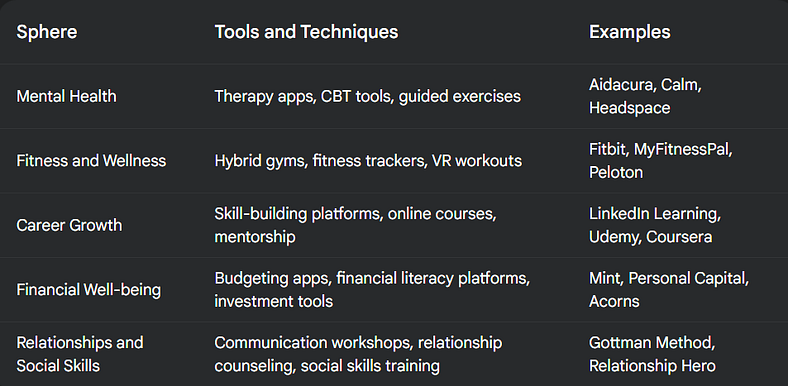Last Updated on October 30, 2025 by vitaliy
Imagine a world where your self-improvement journey is guided by artificial intelligence, where virtual reality transports you to serene meditative landscapes, and where biofeedback devices optimize your mental and physical performance. This is not science fiction; it’s the reality of self-improvement in 2025.

Self-improvement has been an integral part of the human experience for centuries. From ancient philosophers seeking wisdom to modern-day individuals striving for personal growth, the desire to become better versions of ourselves has persisted throughout history. But the tools, techniques, and focus of self-improvement are constantly evolving, and 2025 promises a new era of personalized, technology-driven, and holistic approaches to personal development.
The Evolution of Self-Improvement
The pursuit of self-improvement has a rich and varied history. In ancient civilizations, self-improvement was often intertwined with philosophical and spiritual practices. Ancient Egyptians, for example, had a genre of instructional literature called “sebayt” that offered guidance on living a virtuous life. Similarly, ancient Greek philosophers emphasized self-reflection and moral development as key aspects of personal growth.

Over time, the concept of self-improvement has shifted. While ancient philosophies focused on cultivating virtues and building character, modern approaches often emphasize enhancing personality and achieving external goals. This shift reflects a broader societal trend towards individualism and self-optimization.
The invention of the printing press in the 15th century democratized access to self-improvement knowledge. Conduct books and self-help manuals became widely available, offering advice on a range of topics, from social etiquette to financial management. The 19th century saw the rise of the modern self-help movement, with figures like Samuel Smiles promoting self-reliance and individual responsibility.
Today, technology is revolutionizing the way we approach self-improvement. The internet has made self-help resources more accessible than ever before. Studies show that web-based platforms for self-help have increased by over 150% in the last decade, empowering individuals to embark on personal growth journeys from the comfort of their homes.
Why Evaluating Effectiveness Matters
With the abundance of self-improvement resources available, it’s crucial to evaluate their effectiveness and choose tools that align with our personal goals and values. While some methods have proven their value over time, others may be fleeting trends or even counterproductive.
Evaluating effectiveness involves considering several factors. First, we need to track our progress and measure the impact of our self-improvement efforts. This can involve setting specific goals, monitoring our behavior, and using tools to track our progress. Second, we need to be accountable for our actions and ensure that we are consistently applying the techniques and strategies we learn.
Furthermore, self-improvement should not be seen as a quick fix but rather a continuous journey of growth and development. It’s about cultivating habits, mindsets, and skills that support long-term well-being.
The benefits of effective self-improvement extend beyond achieving external goals. Personal growth can have a profound impact on mental health, leading to increased self-esteem, reduced anxiety and depression, and improved emotional well-being.
Major Shifts in Tools and Focus Areas
The self-improvement landscape of 2025 is marked by several significant shifts:

- Technology-driven personalization: Artificial intelligence (AI) is transforming self-improvement by enabling personalized experiences. AI-powered apps can analyze individual needs, provide tailored recommendations, and offer customized feedback. This shift towards personalization is making self-improvement more effective and engaging.
- Holistic well-being: There’s a growing recognition that self-improvement encompasses more than just achieving specific goals. It’s about cultivating overall well-being, including physical, mental, and emotional health. This holistic approach emphasizes balance and integration, recognizing the interconnectedness of different aspects of our lives.
- Community and connection: Social media and online platforms are fostering a sense of community among individuals pursuing self-improvement. Online groups, forums, and challenges provide support, accountability, and shared learning experiences. This sense of connection can be a powerful motivator and source of inspiration.
- Digital Detox: With the increasing prevalence of technology in our lives, there’s a growing awareness of the need for digital detox. Taking breaks from screens, engaging in mindful technology use, and prioritizing real-life interactions are becoming essential aspects of self-care and mental well-being.
- Accessibility and inclusivity: The self-improvement industry is becoming more aware of the need to reach diverse audiences. This includes addressing cost barriers, language differences, and cultural contexts to ensure that everyone has the opportunity to benefit from personal growth resources.
These shifts are shaping the future of self-improvement, creating new possibilities for personal transformation and empowering individuals to take control of their own growth journeys.

Self-Improvement Tools and Platforms
The digital age has ushered in a wealth of self-improvement tools and platforms, catering to diverse needs and preferences. Here are some key categories:
- Productivity Apps: Apps like Toggl, Hours, and Qbserve help individuals track their time, identify work habits, and improve productivity. These tools can be valuable for managing time effectively and achieving goals.
- Self-Improvement Podcasts: Podcasts offer a convenient way to access self-improvement advice and inspiration. They can be listened to while commuting, exercising, or relaxing, making them a versatile tool for personal growth.
- Online Learning Platforms: Platforms like Skillshare, Udemy, Mindvalley, and Lumosity offer a wide range of courses and resources for personal and professional development. These platforms provide access to expert knowledge and interactive learning experiences. Many users often weigh options like Mindvalley vs. MasterClass to find the right fit. If you’re exploring this path, it can be helpful to see a breakdown of the 10 best Mindvalley courses to understand the potential topics.
- Mindfulness and Meditation Apps: Apps like Headspace and Calm provide guided meditations, mindfulness exercises, and relaxation techniques. These tools can help individuals reduce stress, improve focus, and cultivate emotional well-being.
- Habit Trackers: Apps like Habitica and Strides help individuals build and maintain positive habits. These tools use gamification and tracking mechanisms to motivate and encourage consistent behavior change.
- Fitness and Wellness Apps: Apps like MyFitnessPal and Fitbit help individuals track their fitness goals, monitor their nutrition, and stay motivated. These tools, which include specialized programs like Wildfit, can be valuable for improving physical health and well-being.
- Mental Health Apps: GoalDigger App, Aidacura use AI technology to provide support for mental health. They offer features such as chatbots, journaling, mood tracking, and goal setting to help individuals manage their mental well-being.
This is just a small sample of the many self-improvement tools and platforms available. The key is to find the tools that best fit your individual needs and preferences.

Data-Driven Self-Improvement
Data analysis is playing an increasingly important role in self-improvement. By tracking our behavior, monitoring our progress, and analyzing our data, we can gain valuable insights into our strengths, weaknesses, and areas for improvement.
Data-driven self-improvement can take many forms. Time-tracking tools and productivity apps can help us understand how we spend our time and identify areas where we can be more efficient. Learning analytics platforms can track our progress in educational endeavors, helping us identify areas where we need to focus our efforts. Mood trackers and journaling apps can help us understand our emotional patterns and identify triggers for negative thoughts or behaviors.
Adaptive learning systems can provide personalized feedback and tailor learning experiences to individual needs and preferences. This data-driven approach can make self-improvement more effective and efficient.
Overrated and Ineffective Tools
While many self-improvement tools can be beneficial, it’s important to be aware of those that may be overrated or ineffective. It’s why reading reviews and complaints about any platform is a crucial step. Some tools may promote unrealistic expectations or encourage an obsessive focus on self-optimization, leading to burnout or disappointment.
For example, some self-help gurus may promote the idea that constant self-work is necessary for happiness and success, leading individuals to feel inadequate or overwhelmed. Similarly, some biohacking methods may not be scientifically supported and could even be harmful.
It’s essential to approach self-improvement with a balanced perspective, recognizing that it’s a journey, not a destination. Focusing on sustainable habits, realistic goals, and evidence-based methods is crucial for achieving lasting personal growth.
Breaking Down Self-Improvement Spheres
Self-improvement can be applied to various aspects of life. Here’s a breakdown of some key spheres and the tools and techniques associated with them:

The Future of Self-Improvement
The future of self-improvement is likely to be shaped by continued advancements in technology, evolving societal trends, and a deeper understanding of human behavior and motivation.
- AI and VR: Artificial intelligence and virtual reality are poised to revolutionize self-improvement. AI-powered coaching, personalized learning experiences, and immersive VR simulations could create new possibilities for personal growth.
- Ethical Considerations: As self-improvement becomes increasingly intertwined with technology, ethical considerations will become more important. Issues such as data privacy, algorithmic bias, and the potential for manipulation will need to be addressed.
- Focus on Emotional Experiences: While rationality and self-discipline are important aspects of self-improvement, the future may see a greater emphasis on emotional experiences and the role of emotions in personal growth.
The self-improvement landscape of 2030 and beyond is likely to be even more personalized, integrated, and technology-driven, offering new opportunities for individuals to achieve their full potential.
Finding the Right Tools for You
With the abundance of self-improvement resources available, it’s essential to find the tools and techniques that best fit your individual needs, goals, and preferences.
Consider your learning style, your preferred methods of engagement, and your specific areas of focus. Experiment with different tools and platforms to find what resonates with you.
Remember that self-improvement is a personal journey. What works for one person may not work for another. The key is to be proactive, persistent, and open to exploring new approaches.
Conclusion: Embracing the Future of Personal Growth
Self-improvement in 2025 is a dynamic and evolving landscape. Technology is driving personalization, holistic well-being is taking center stage, and accessibility and inclusivity are becoming increasingly important.
By embracing these trends, evaluating effectiveness, and finding the right tools for our individual needs, we can unlock new possibilities for personal growth and create a future where self-improvement is more accessible, engaging, and transformative than ever before.




